 Alfalfa in dog food? Alfalfa reminds me more of my house rabbit keeping days. Imagine my surprise when I was scanning the list of ingredients on the back of a dog food bag and saw ‘alfalfa meal’ listed! So what, exactly, is alfalfa? Why is it used as an ingredient in some dog foods? Is it an ingredient you should avoid or is it beneficial to feed our dogs? Read on to find out!
Alfalfa in dog food? Alfalfa reminds me more of my house rabbit keeping days. Imagine my surprise when I was scanning the list of ingredients on the back of a dog food bag and saw ‘alfalfa meal’ listed! So what, exactly, is alfalfa? Why is it used as an ingredient in some dog foods? Is it an ingredient you should avoid or is it beneficial to feed our dogs? Read on to find out!
This is our first post for the 2023 April blogging from A to Z Challenge! Join us this month as we go through the alphabet, A to Z, learning more about some of the ingredients that are commonly (or not so commonly, in some cases) found in our dog’s food!
Post Contents:
What is Alfalfa?
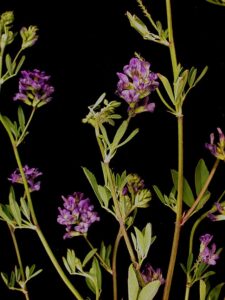
Photo Credit: Ayotte, Gilles. Licensed under the Creative Commons Attribution-Share Alike 4.0 International license.
Alfalfa, scientific name Medicago sativa, is a perennial flowering plant in the legume family. Alfalfa plants resemble clovers. It eventually develops small purple flowers that are actually quite pretty.
Alfalfa is commonly farmed for grazing animals, to make hay, and as a cover crop. In countries outside of the US, alfalfa may go by the name lucerne. As I learned, again, in my rabbit keeping days, alfalfa hay is higher in minerals, fat, and protein than grass-type hays. Because of its higher fat content, and because the higher amounts of calcium in alfalfa can cause bladder sludge in rabbits, alfalfa is not usually recommended as a staple in the diet of adult rabbits. But enough about rabbits, what about dogs!?
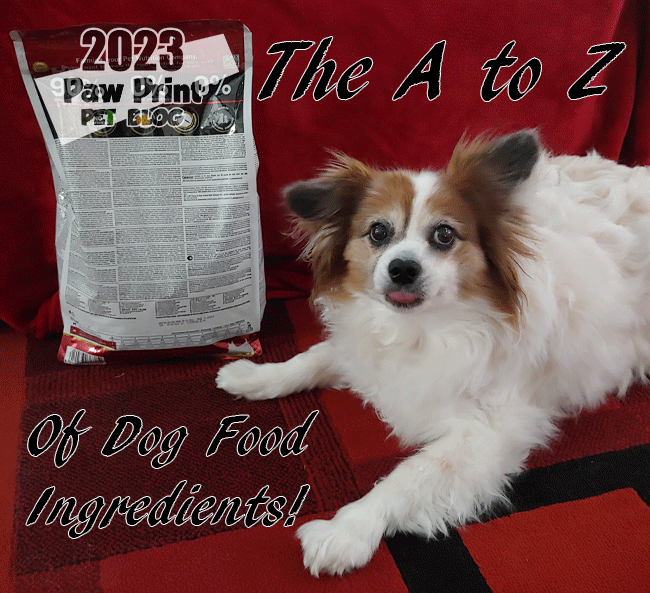
Why is Alfalfa/Alfalfa Meal Added to Some Dog Foods?
Hay isn’t usually an ingredient associated with dogs! So why is alfalfa or alfalfa meal used in some dog foods? As I mentioned above, alfalfa is rich in nutrients, including protein, calcium, and also potassium, magnesium, beta-carotene, and vitamins A, B12, C, D, E, and K. When it comes to dog food ingredients, alfalfa is cheap. It’s certainly cheaper than meat. Adding alfalfa meal to dog food can be a cheap way to increase the protein content.
Cons of Feeding Alfalfa to Dogs:
In that way, alfalfa meal can be seen as a filler ingredient in dog food. It increases the protein level without having to use more expensive ingredients, namely meat. The protein in alfalfa and other plants, however, is not the same as the protein your dog would get from a meat source. Meat provides amino acids that plants don’t contain. There are a couple of other potentially concerning components of alfalfa…
- Alfalfa is also known to contain phytoestrogens. Phytoestrogens, or plant estrogens, can act as endocrine disruptors that can lead to health issues.
- It also contains vitamin K, which can act as a natural anti-coagulant. Owners with dogs who suffer from anemia should take note.
- Coumarin is a chemical naturally found in alfalfa that can impact liver health in large amounts.
- Saponin is another chemical found in alfalfa that can cause GI issues in dogs.
- L-Canavanine is present in the seeds of alfalfa, and is toxic to dogs.
- Alfalfa flowers, like other flowers, contains pollen that can trigger allergies in dogs.
Benefits of Feeding Alfalfa to Dogs:
Despite those cons, there are also some benefits to feeding alfalfa to dogs…
- Alfalfa is a natural anti-inflammatory and has been shown to help relieve the symptoms of arthritis and other inflammatory issues.
- Alfalfa is good for kidney health. It can act as a natural diuretic and helps deal with overly acidic urine.
- Alfalfa contains saponins that can help your dog absorb fat-soluble nutrients.
- The chlorophyll in alfalfa can help improve your dog’s breath and dental health.
- Alfalfa is, once again, rich in beneficial nutrients.
- Alfalfa is thought to help protect the body against carcinogens that can cause cancer.
So What’s the Verdict on Alfalfa? Is it Safe as a Dog Food Ingredient?
The vitamin K content is alfalfa is only really a concern for dogs suffering from anemia. Coumarin and saponin shouldn’t cause any issues unless you are feeding your dog alfalfa in extreme amounts. Luckily, commercially produced alfalfa meal doesn’t usually contain flowers or seed heads, so that eliminates the risks of allergies caused by pollen and the toxic effects of L-Canavanine.
Most of the cons of feeding alfalfa are essentially eliminated as long as it’s being fed in moderation. Alfalfa can provide some benefits, although in most cases it’s probably being added to dog food as a way to boost protein, and maybe nutrient, levels on a budget. Essentially, alfalfa meal used in dog food can be categized as a filler.
But that doesn’t necessarily make it bad. The senior brand dog food I often buy for my 14 year old Papillon, Kitsune, contains alfalfa meal. I still consider the kibble to be a high quality brand. Kitsune does really well on it, and has had zero issues with the alfalfa meal or any of the other ingredients in the food. It’s all relative, and the name of the game is moderation. A dog food that contains other, high quality, ingredients and also contains a bit of alfalfa meal is probably just fine. Remember, you have to feed the dog in front of you. What works well for one won’t necessarily be the “perfect” food for all.
- Selecting the Best Dog Food Based on Your Dog’s Individual Needs (What I feed My Own Dogs)
- Why I Don’t Generally Recommend Specific Dog Foods
- Dog Treat Recipes
- “People” Food Dogs Can Eat!
Comment below! Did you know that alfalfa meal is sometimes used as an ingredient in dog food? Do you currently feed your dog a food that contains alfalfa?
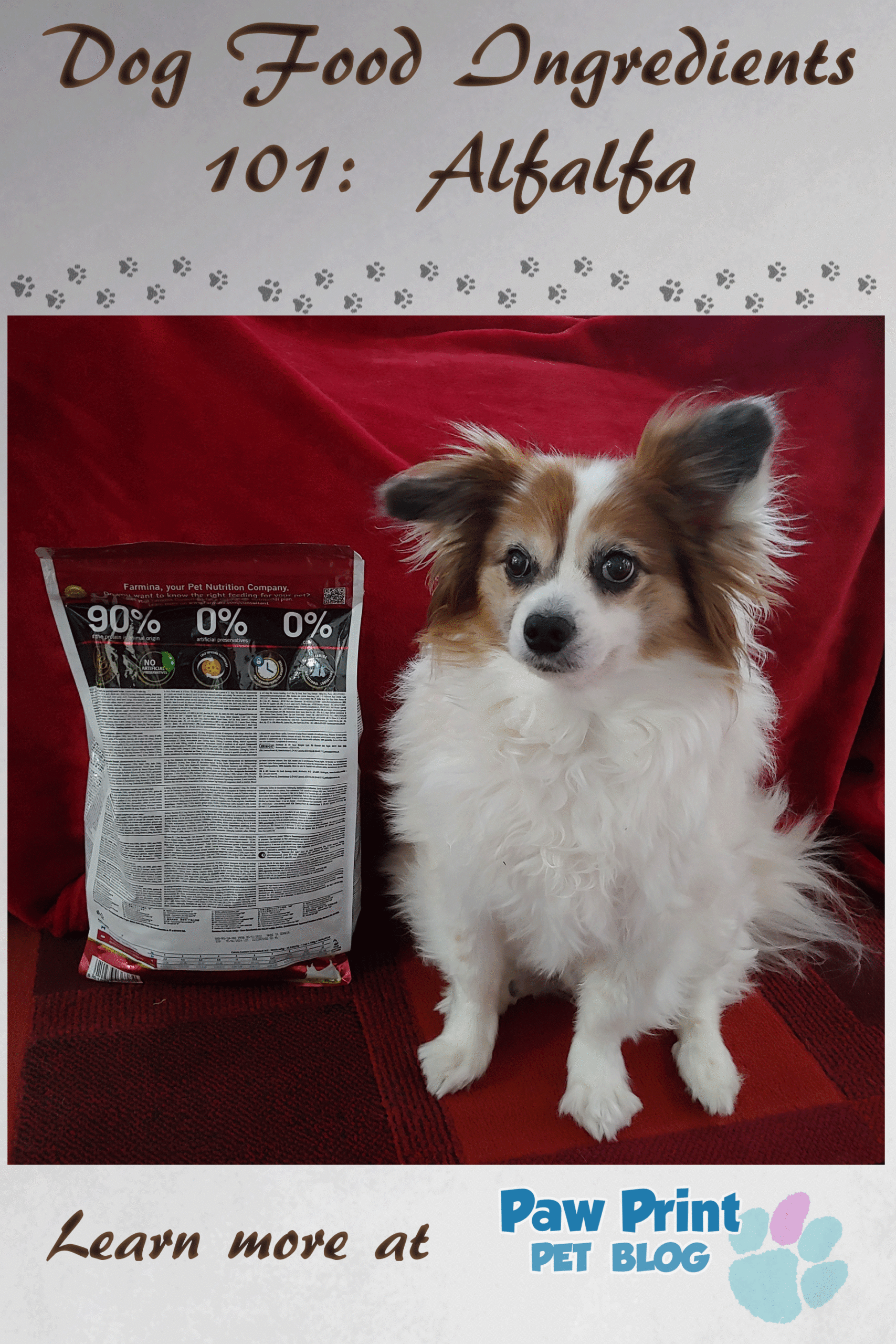

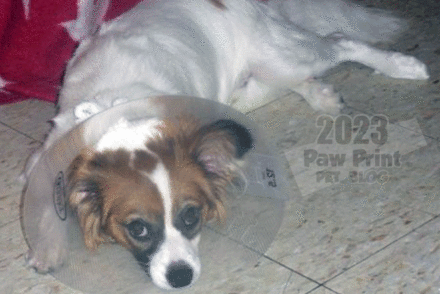
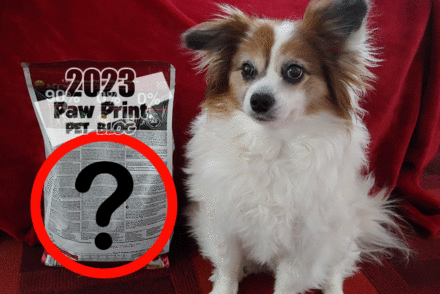


1 Comment
Yeah, when I read “alfalfa” I first thought about horse feed 🙂 I’ll have to check if my current dog food has this ingredient.
Ronel visiting for A:
My Languishing TBR: A
Accomplished Athena